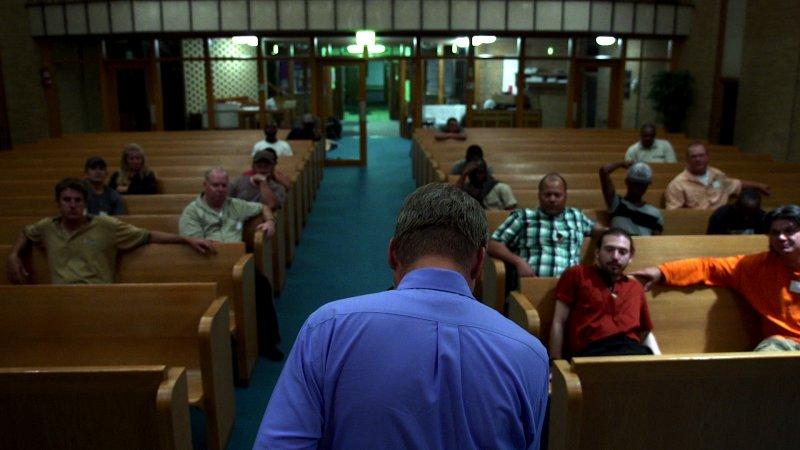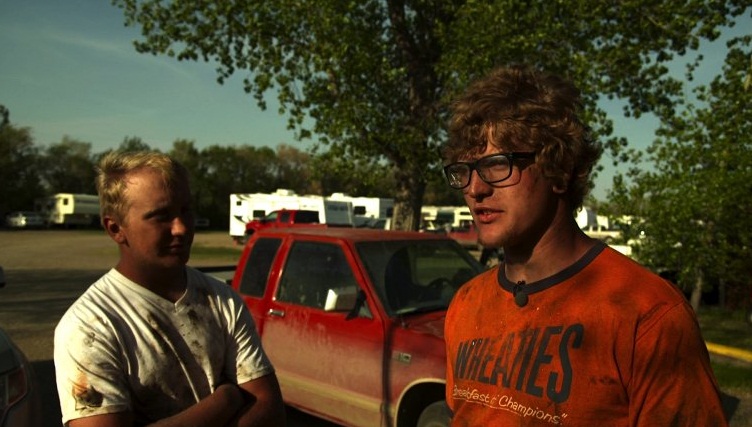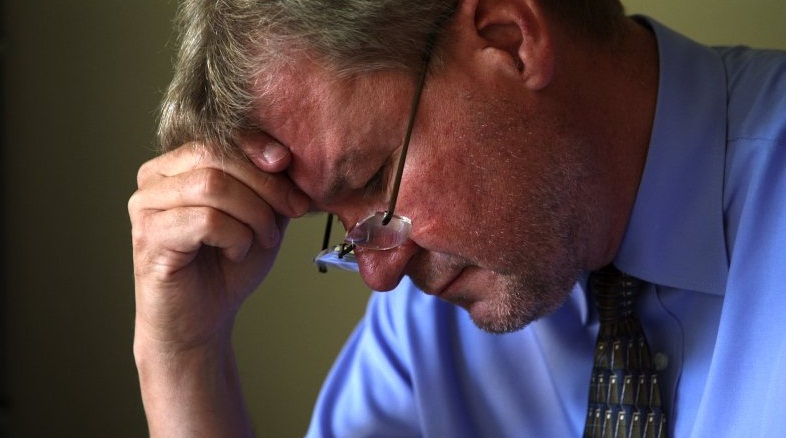The Overnighters | reviews, news & interviews
The Overnighters
The Overnighters
The dark side of the American dream caught in searing US indie documentary

In The Overnighters documentarist Jesse Moss found his story and pursued it with remarkable empathy, all in the best traditions of the genre. He persuaded both sides in this tale of (quiet) confrontation to trust him, and they opened up completely. Then closing minute revelations that come as a total shock take his film to a different level, turning what would have been a strong film in itself into something that will stay in the memory for a very long time.
It made us ponder that frequent question with the form: what persuades the subjects of a film to continue cooperation, when the subject matter moves into territory that is as bruising as it gets? It would be very cynical indeed to say that Moss “got lucky” when events revealed themselves that he surely can’t have expected. But it’s also tribute to the connection he must have built up over long months of work that the issue of turning off the camera never appeared to come up.
Others concerned seemed just pretty asocial by nature
Moss found his subject in the small town of Williston, North Dakota, where local hydraulic fracking has given rise to an oil boom, supposedly offering abundant opportunities for those whose lives elsewhere in the States have hit a low point. It was that old story: the migrant dream, the kind the director has compared to Steinbeck’s Grapes of Wrath. But the reality on the ground proved very different for some who made the journey.
Not least because, with Williston’s hotels and camp sites full, there weren’t enough places to stay, even for those who did find jobs (we saw both those who did okay, pictured below left, and those who clearly hadn’t). The very articulate Pastor Jay Reinke of the local Concordia Lutheran Church reacted by offering accommodation in the church’s building to the “overnighters” of the film’s title, except that some of those stays stretched into weeks and months. (Moss himself spent the first six months of his production staying on the church's premises, giving him a more than close accord with his subjects).
 The larger issue, though, was that the lives of plenty of these arrivals were “broken”, a word that cropped up a lot in The Overnighters and not only from Reinke. Were they failures, or rather as the pastor expressed it, “they’d not succeeded as they’d hoped”? He was preaching (main picture) the biblical language of “the gospel of love” and “Who is my neighbour?”, while some of his congregation (though with no voices raised) were using the equally biblical language of “rape, pillage and burn”. We saw the town council meetings where both viewpoints were aired, as potential restrictions on the church’s use as a shelter gradually encroached.
The larger issue, though, was that the lives of plenty of these arrivals were “broken”, a word that cropped up a lot in The Overnighters and not only from Reinke. Were they failures, or rather as the pastor expressed it, “they’d not succeeded as they’d hoped”? He was preaching (main picture) the biblical language of “the gospel of love” and “Who is my neighbour?”, while some of his congregation (though with no voices raised) were using the equally biblical language of “rape, pillage and burn”. We saw the town council meetings where both viewpoints were aired, as potential restrictions on the church’s use as a shelter gradually encroached.
While we sensed that Moss’s sympathies lay with Pastor Reinke, he was pretty impartial in how he structured his film. When things started to go wrong, the drama only heightened. A local schoolteacher was murdered (no apparent connection to Reinke’s ministry), and then the local paper discovered that sex offenders were among those living in the church: we saw the priest being pursued by a local reporter. Background checks by Reinke’s people were being run as strictly as you imagine possible, but some had clearly evaded them, not least one individual who had become something of a pivot of the church structure: it made for some nasty break-ups. Others concerned seemed just pretty asocial by nature.
When details of one particular sex-offender – whether an 18-year-old young man sleeping with a 16-year-old woman counts as something of a qualification of that term, we might wonder – came out, Pastor Reinke invited the man concerned to stay in his own home. We came to know the pastor’s family quite well, his wife Andrea and teenage children, and they were open on camera about some of their reservations: when Andrea said she’d be glad when it would all be over we certainly knew how she felt.
 There was the inescapable question too as to whether Reinke was in some way playing to the camera (to be fair, he questioned his own motives quite frequently). Was he articulating God’s love for sinners, or building himself an image as one who cared despite all opposition? Or was it, considering those devastating final minutes, something even beyond that, a sense of the inexorable, that had been bubbling along underneath all the while, coming through? Moss offered no clear answers. (Pastor Reinke tested, pictured above right)
There was the inescapable question too as to whether Reinke was in some way playing to the camera (to be fair, he questioned his own motives quite frequently). Was he articulating God’s love for sinners, or building himself an image as one who cared despite all opposition? Or was it, considering those devastating final minutes, something even beyond that, a sense of the inexorable, that had been bubbling along underneath all the while, coming through? Moss offered no clear answers. (Pastor Reinke tested, pictured above right)
The Overnighters deservedly won the special jury prize at the Sundance festival last year. Moss filmed it all himself, and there was both spare visual consideration of these borderline lives, and a certain beauty in the surrounding landscapes. The score from Brooklyn musician T Griffin was no less laconic, recalling in some ways Tom Waits. No surprise there: the lives of many of those we saw in this film were straight from the Waits songbook.
Overleaf: watch the trailer for The Overnighters
rating
Explore topics
Share this article
more Film
 Back to Black review - rock biopic with a loving but soft touch
Marisa Abela evokes the genius of Amy Winehouse, with a few warts minimised
Back to Black review - rock biopic with a loving but soft touch
Marisa Abela evokes the genius of Amy Winehouse, with a few warts minimised
 Civil War review - God help America
A horrifying State of the Union address from Alex Garland
Civil War review - God help America
A horrifying State of the Union address from Alex Garland
 The Teachers' Lounge - teacher-pupil relationships under the microscope
Thoughtful, painful meditation on status, crime, and power
The Teachers' Lounge - teacher-pupil relationships under the microscope
Thoughtful, painful meditation on status, crime, and power
 Blu-ray: Happy End (Šťastný konec)
Technically brilliant black comedy hasn't aged well
Blu-ray: Happy End (Šťastný konec)
Technically brilliant black comedy hasn't aged well
 Evil Does Not Exist review - Ryusuke Hamaguchi's nuanced follow-up to 'Drive My Car'
A parable about the perils of eco-tourism with a violent twist
Evil Does Not Exist review - Ryusuke Hamaguchi's nuanced follow-up to 'Drive My Car'
A parable about the perils of eco-tourism with a violent twist
 Io Capitano review - gripping odyssey from Senegal to Italy
Matteo Garrone's Oscar-nominated drama of two teenage boys pursuing their dream
Io Capitano review - gripping odyssey from Senegal to Italy
Matteo Garrone's Oscar-nominated drama of two teenage boys pursuing their dream
 The Trouble with Jessica review - the London housing market wreaks havoc on a group of friends
Matt Winn directs a glossy cast in a black comedy that verges on farce
The Trouble with Jessica review - the London housing market wreaks havoc on a group of friends
Matt Winn directs a glossy cast in a black comedy that verges on farce
 Silver Haze review - daughters of Albion dealing with damage
Vicky Knight and Esmé Creed-Miles shine in a drama inspired by Knight's tragic past
Silver Haze review - daughters of Albion dealing with damage
Vicky Knight and Esmé Creed-Miles shine in a drama inspired by Knight's tragic past
 Mothers' Instinct review - 'Mad Women'
Sixties suburban duel veers between daftness and spooky power
Mothers' Instinct review - 'Mad Women'
Sixties suburban duel veers between daftness and spooky power
 Godzilla x Kong: The New Empire review - a bit of a monster let-down
Old foes become new friends amid the usual wreckage
Godzilla x Kong: The New Empire review - a bit of a monster let-down
Old foes become new friends amid the usual wreckage
 The Origin of Evil review - Laure Calamy stars in gripping French psychodrama
Sébastien Marnier directs an excellent cast in a story of shifting identities
The Origin of Evil review - Laure Calamy stars in gripping French psychodrama
Sébastien Marnier directs an excellent cast in a story of shifting identities
 DVD/Blu-ray: Padre Pio
Shia LaBeouf stars in Abel Ferrara's latest grungy spiritual quest, earthed by landscape and politics
DVD/Blu-ray: Padre Pio
Shia LaBeouf stars in Abel Ferrara's latest grungy spiritual quest, earthed by landscape and politics

Add comment